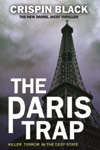|
THE PARIS TRAP:
A DANIEL JACOT SPY MYSTERY
by Crispin Black
|
 Robert Harris, the well-known thriller writer, when asked about his genre said, ‘In the end, every writer writes about themselves and their preoccupations’. Crispin Black, a gifted and engaging former Welsh Guards officer, who left the Army as a lieutenant colonel on the briefing staff for the Cabinet Office and Cobra, has written his second thriller. It follows the exploits of Colonel Daniel Jacot of the ‘Celtic Guards’, a former Falklands veteran with mild PTSD, who is now the British national security adviser’s representative in our Paris embassy. It’s a terrific read. Robert Harris, the well-known thriller writer, when asked about his genre said, ‘In the end, every writer writes about themselves and their preoccupations’. Crispin Black, a gifted and engaging former Welsh Guards officer, who left the Army as a lieutenant colonel on the briefing staff for the Cabinet Office and Cobra, has written his second thriller. It follows the exploits of Colonel Daniel Jacot of the ‘Celtic Guards’, a former Falklands veteran with mild PTSD, who is now the British national security adviser’s representative in our Paris embassy. It’s a terrific read.
If you’re writing a thriller, you’ve got to tell a story, to have a plausible idea, as in Robert Harris’s first bestseller Fatherland - ‘What if Nazi Germany won the war and became a superpower?’ Character development, descriptive passages, dialogue and prose style are important, but the novel must be plot driven. It also needs pace and a tight time-frame.
Talleyrand, Napoleon’s foreign minister, famously said that treason was largely a matter of dates, and in our post Brexit world Crispin plots a convincing story line where ‘remainers’, ‘brexiteers’ and those European bureaucrats committed to the European project can only too easily lose their bearings at the highest levels of government. The deaths of two Queen’s messengers and an aristocratic senior French intelligence officer set hares running in every direction. The contemporary backdrop of imminent Jihadist attacks in Europe’s capitals adds ambiguity to a complex intelligence world. The denouement is unexpected, pacy and exciting.
Where Crispin excels, and this is an attribute shared by the best thriller writers, is his descriptive passages. The French Foreign Legion and its enduring romance, the inner workings of the French and British governments, the culture and history of the Fifth Republic, the famous Hôtel des Invalides, the equivalent of our Royal Hospital, even a vignette of a typical Paris restaurant, bring the narrative to life so that you feel you’re an accomplice to the novel’s main characters.
Characterisation and dialogue were some of the weaker aspects in Crispin Black’s first novel, The Falklands Intercept but in The Paris Trap he rarely strikes a false note. Even the occasional slip up, such as Jacot’s response to the news that a colleague whom he knows well has been killed in a ‘hit and run’ incident, ‘Oh God, how awful, he was such a nice man and deserved a bit of good luck’ seems more stiff upper lip than bogus dialogue. ‘Show, don’t tell’ is a sound principle of good writing, more easily done in a novel than in a thriller where detail is important in bringing the narrative action to life. Black achieves a good balance, allowing us full rein in our imagination over his ‘love interest’ - the exotic Monica Zaden, but giving us just the right detail on why the Glock 17 pistol is preferable to the Browning 9mm.
There’s a lively and believable cast of characters. With just a few brushstrokes, Crispin brings them to life. Lady Nevinson, the UK’s National Security Adviser, just a little dry in The Falklands Intercept, becomes a mixture of the ruthless Judi Dench in the Bond films and an elegant, alluring older woman. Colonel Jacot’s wingman, mentor in the art of hard soldiering and marksmanship, is the superbly portrayed Sergent-Chef Paradis of the Foreign Legion. Black has also made the cast manageable so one never has to reread stuff to remind yourself who’s who and what part they play in a fast-developing narrative. Still, one never quite warms to the main character, Colonel Jacot. Lead characters must be sympathetic, likeable, full of doubts and contradictions. Apart from invariably wearing ‘A dark-blue Savile Row suit with a cream silk shirt and maroon, knitted silk tie with highly polished shoes’, and an unerring ability to down a bottle of Foreign Legion Calvados most nights, Jacot remains an enigmatic figure.
As an accomplished BBC commentator on intelligence and terrorism, Crispin writes beautifully, and never falls into the trap of writing to impress rather than express. As an old Harrovian and veteran of the Falklands campaign - he was blown up on the Sir Galahad - he has a shrewd appreciation of how people behave. And he can’t resist a few well-aimed hits at people and institutions of whom he has a poor opinion, as in Jacot’s aside to Lady Nevinson, ‘Every time you read an air vice marshal’s obituary… you discover the name of a new public school’
This is an accomplished thriller by a fine and knowledgeable writer. I much look forward to the next adventure of Colonel Jacot, Sergent-Chef Paradis and Lady Nevinson, set in Venice, and due out in 2018.
Paul de Zulueta
The Paris Trap: A Daniel Jacot Spy Mystery. Gibson Square Books. www.gibsonsquare.com £8.99
|
|